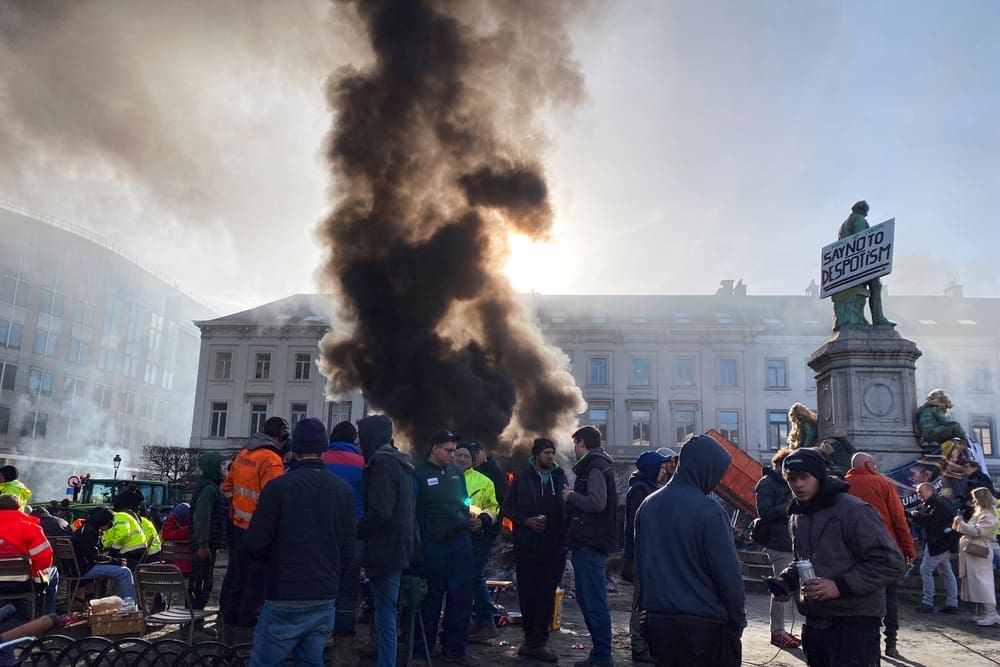AS European farmers continue to fill capital cities with tractors and hay bales, many are asking if the tide is turning on restrictive agriculture policies aimed at reducing the continent’s impact on the climate.
It is well and truly election season in Europe, with European Parliament elections due this May and many European countries having local elections.
The current European Parliament has been described as the “greenest ever” and has attempted to lead the world with its climate policies in recent years – aiming to limit the use of fertiliser and pesticides, cut livestock numbers and impose restrictions on imports that do not have the same standards. Other countries like New Zealand and Australia, to an extent, have tried to follow suit.
But the regulations have been controversial for many reasons, with farmers concerned about being regulated out of business and scientists worried the environmental and health policies are based on ideology more than science.
In response, thousands of farmers have descended on some of the continent’s biggest cities, including Paris, Brussels and Berlin, to make their voices heard.
Some signs the Government is changing its tune are starting to appear, with the European Parliament scrapping a plan to halve pesticide use by 2030 and announcing strategic consultation on the policies.
Spain becomes the center of European farmers’ protests
The video shows the city of Leon today. Farmers continue to arrive in Spanish cities, and border checkpoints with France remain partially blocked. pic.twitter.com/GIVwB4BJEf
— S p r i n t e r (@Sprinter99800) February 12, 2024
‘
Cost of living taking over climate
Former UK Liberal Democrat politician and political consultant George Lyon said the high inflation brought on by the Russia/Ukraine war has contributed to community dissatisfaction with the climate policies.
“We have gone from a situation where the parliament was seen as the ‘greenest ever’, net zero as number one priority, to the Ukraine war breaking out, high inflation and the green policies seen as peripheral to cost of living,” Mr Lyon said.
“All of a sudden consumers are saying ‘you are expecting us to pay more for our heating systems, more for electric cars and more for our food – we believe in net zero, but we are not going to pay for it’.
“For the first time since the last financial crisis people are under real financial pressure and we haven’t seen high inflation for ages.”
Asked if the farmers are starting to pick up support from the general population, Mr Lyon said he sensed there was dissatisfaction from people about the Government telling them what to do.
“Politicians have not been honest with the public about how much this is going to cost, they have sold people the climate scare story about livestock killing the planet,” he said.
“Now people are going ‘this means I can’t even buy beef and eat what I want to eat or use my gas boiler for heating’ and I think politicians have misjudged where the community is on this – Ukraine was the trigger for that.”
Dutch farmer win a catalyst
One of the most controversial climate policies attempted in Europe was a plan to close thousands of livestock farms in The Netherlands in a bid to reduce nitrogen pollution – which saw farmers block supermarket distribution centres with tractors and light silage bags on fire out the front of parliament.
The protests resulted in the formation of a farmer-based political party, which won the majority of seats in The Netherlands provincial elections and have brought the nitrogen laws back to negotiation.
“After that farmers party victory in The Netherlands, a lot of the centre right parties became worried about a whole lot of farmers parties starting in other countries and started shifting to oppose the green policies,”
“Then the farmers thought ‘we have some power again’ and started to get some of the policies watered down.
“The protest in Brussels was huge, it brought the city to a standstill for a whole day, Paris was besieged by them as well.”
Ag still doing its bit for the climate
Mr Lyon said many European farmers were not opposed to the environmental cause, the issue was more in the approach of Government.
“Big supply chain companies are also putting a lot of pressure on farmers to reduce their emissions, but they are doing it the right way – which is doing it through efficiencies and making an economic case to back up the actions,” he said.
“Rather than this stupid idea where you ban pesticides, ban fertiliser, which is completely based on ideology rather than practical sense. There is legislation in the parliament to prevent gene editing in Europe at the moment and farmers are saying ‘if you want us to cut pesticides, then you need to give us the tools to do it’.
“I think this ideological approach will be dumped and we will start to look at the practical ways of doing this.
“Farmers have won the battle about ‘how you do it’, but the idea of doing your bit hasn’t gone away.”

